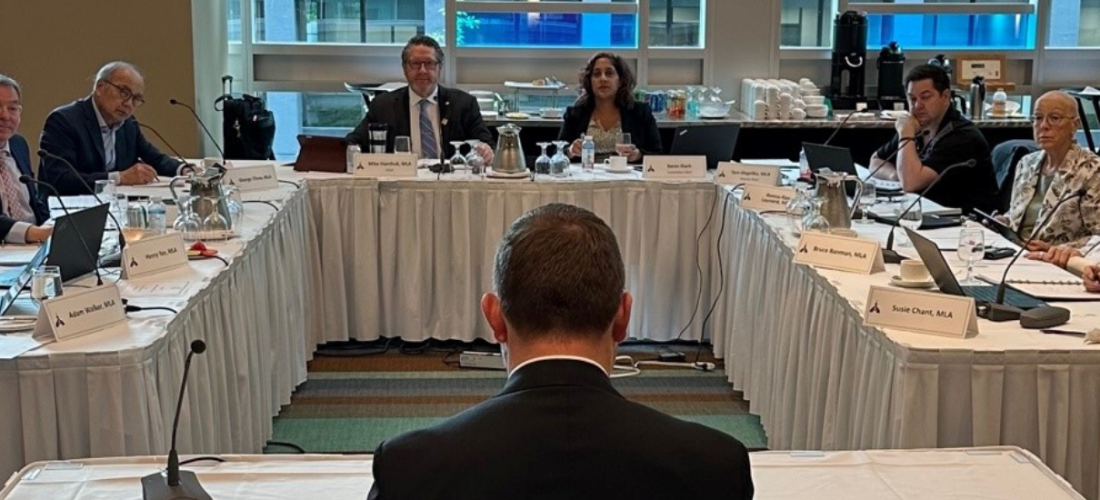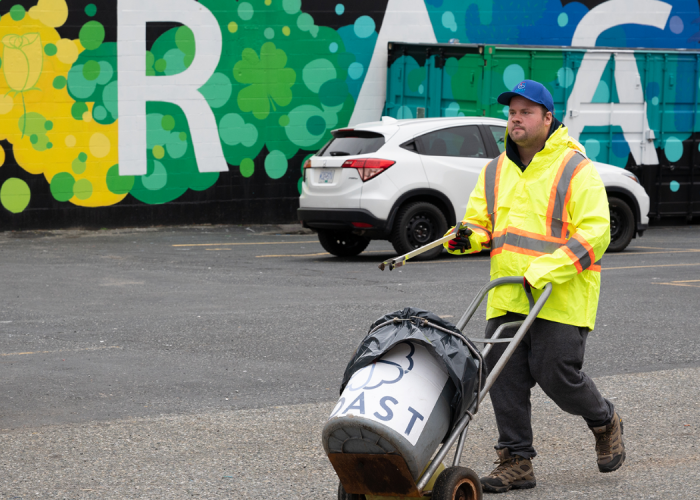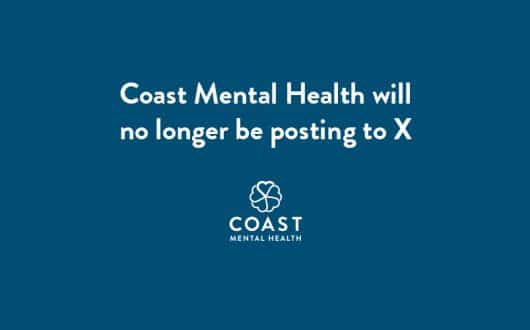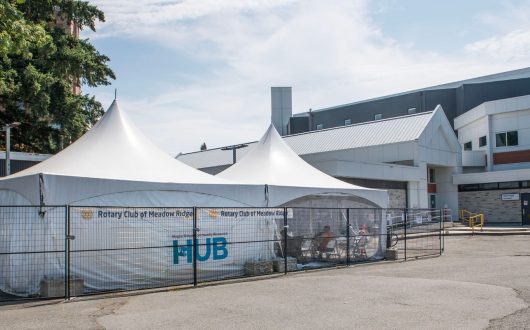Housing with Supports, Employment + Training are key
In June 2023, Coast Mental Health had the opportunity to present to the Select Standing Committee on Finance and Government Services as part of the 2024 Budget Consultation.
As one of BC’s largest providers of community-based mental health services, we believe we can use our experience to provide valuable input in these processes.
Every day for the last 50 years, our incredible staff have been on the frontlines, providing homes, support and employment for folks living with mental illness and substance use disorders.
As the need has grown, so have we.
As needs have changed, we have adapted.
Thanks to donor support, we have innovated and been able to pilot programs like Peer Support Training and Cognitive Rehabilitation which have now become proven and sought-after services across the Province.
But we cannot do it alone. Coast is part of an ecosystem of healthcare services, and we rely on funding from the government and its partners. And continuing to invest in the right areas, we are able to make all the difference for the people we serve.
That’s why we made the following recommendations:
1. Fund housing with appropriate supports for people living with co-occurring mental health and substance use disorders.
Since 1972, Coast Mental Health has been a leader in the delivery of social and supported housing, where we currently operate 53 sites and support over a 5,000 people each year across the Lower Mainland.
Our housing support systems are essential for people living with concurrent mental health and substance use disorders.
Chris’ Story
Chris is an indigenous man who today lives in supported housing operated by Coast Mental Health. Before coming to Coast, Chris had experienced homelessness for 8 years, following the loss of his mother, before finally being connected with and completing a treatment program at the Red Fish Healing Centre.
He continued his recovery journey with Coast Mental Health’s Rehabilitation & Recovery Program also located at səmiq̓wəʔelə. After graduating from this program, he was fortunate to secure housing with integrated mental health supports. After years of living on the streets, Chris is now stable, living in his own home, with access to the care and supports he needs.
Chris was recently featured in a series by CTV.
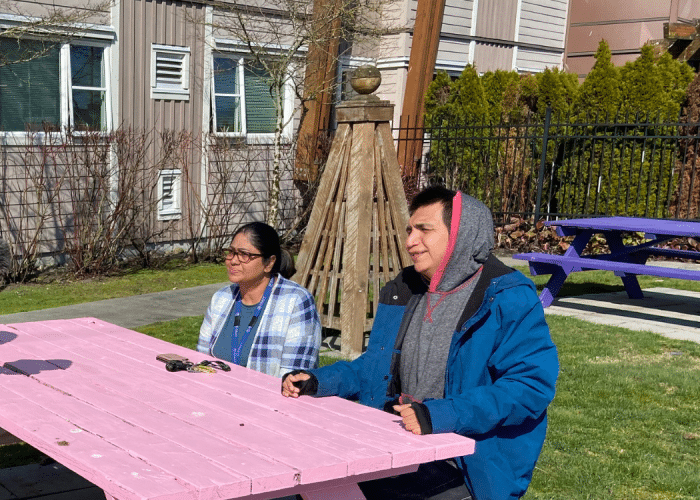
Chris, alongside staff member Veena, was recently interviewed by CTV
That is why we ask government in Budget 2024 to dedicate additional funding to support the provision of comprehensive health supports in both current and future supportive housing programs.
We commend government on their investments in new Complex Care housing services and the additional funding announced in Budget 2023 this year. However, this has now created a two-tier system: on the one hand there are those units that are fortunate to be provided additional resources through Complex Care designation, and the overwhelming majority that are left to operate with just two non-clinical designated staff 24/7.
The reality is that there is little practical difference between clients in units designated as Complex Care and those that are not. The needs continue to be great, and many providers are feeling the strain in supporting individuals with chronic health, mental illness and substance use challenges.
For supportive housing to be successful and for people to have an opportunity to thrive and achieve greater well-being, we require a more comprehensive and integrated approach. One that not only addresses basic needs, but a housing system that promotes well-being and includes services to promote physical health, mental health, and access to healthcare.
2. Invest in specialized employment, education and training programs to support recovery of people living with mental illness.
Coast Mental Health currently operates several employment programs. These help provide purpose and dignity for each person’s recovery, encouraging independence and self-worth. And, we know these community-based employment programs can make all the difference
Justin’s Story
Justin has been a member of Coast’s Clubhouse for four years. In Justin’s words,
“I have a beautiful life today.”
Justin, who is 39-years-old, has lived with schizophrenia for over 20 years and has struggled to develop job-ready skills needed for employment. As a member of the Clubhouse, Justin took part in a number of vocational training opportunities before joining Coast’s Street Clean Team. Today, he works three to four shifts each week.
We call on government in Budget 2024 to invest in additional specialized employment and training programs to support the recovery of people living with mental illness, much like the recent investments announced to integrate employment services into some publicly funded treatment beds.
Employment and education programs can play significant roles in the recovery from mental illness.
Meaningful employment and educational pursuits provide individuals with a sense of purpose and accomplishment, boosting their self-esteem and overall well-being, giving structure and direction.
Programs that work best are personalized and optimized opportunities for employment, education and training.
Employment and education programs also often provide opportunities for individuals to connect with others who share similar experiences and challenges. This social support network can be invaluable in the recovery process, as it fosters a sense of belonging and reduces feelings of isolation.
Research has shown that integrated approaches that combine mental health treatment, counselling, and vocational or educational support tend to yield the best outcomes.
Under this type of model, the employment specialist is integrated into the mental health services team and works to help individuals find, secure and keep meaningful employment.
3. Invest in lasting recovery through dedicated safe, stable and appropriate housing.
In 2019, the BC Government launched its Mental Health and Addictions strategy – A Pathway to Hope.
One of the priority actions was to create seamless and integrated system of care that would connect people to treatment and support ongoing recovery.
There have been significant investments in new substance-use treatment beds and enhanced community-based services and supports. Unfortunately, few of these are able to provide the necessary connections to appropriate housing options.
This is why we are calling on Budget 2024 to invest in lasting recovery and provide funding for stable and appropriate housing for individuals exiting mental health and substance use programs.
Coast Mental Health has demonstrated that an integrated service provision does work. Combining community-based treatment and supportive services with connection to appropriate housing options can play a significant role in sustaining an individual’s recovery.
The goal must be to support people to achieve sustained recovery. We see every day how people thrive when provided stability and given access to long-term supports. What is urgently needed to support those struggling with mental health and addictions, is access to appropriate treatment followed by the provision of safe and affordable housing with services that respond to each individual’s unique needs.
Transitional and supportive housing programs offer recovering individuals the necessary stability and structure to rebuild their lives.
These programs provide access to support groups, and life skills training, enabling individuals to reintegrate into society successfully. The sense of community within such housing arrangements creates a supportive network of peers who understand the challenges of recovery, offering encouragement and accountability.
